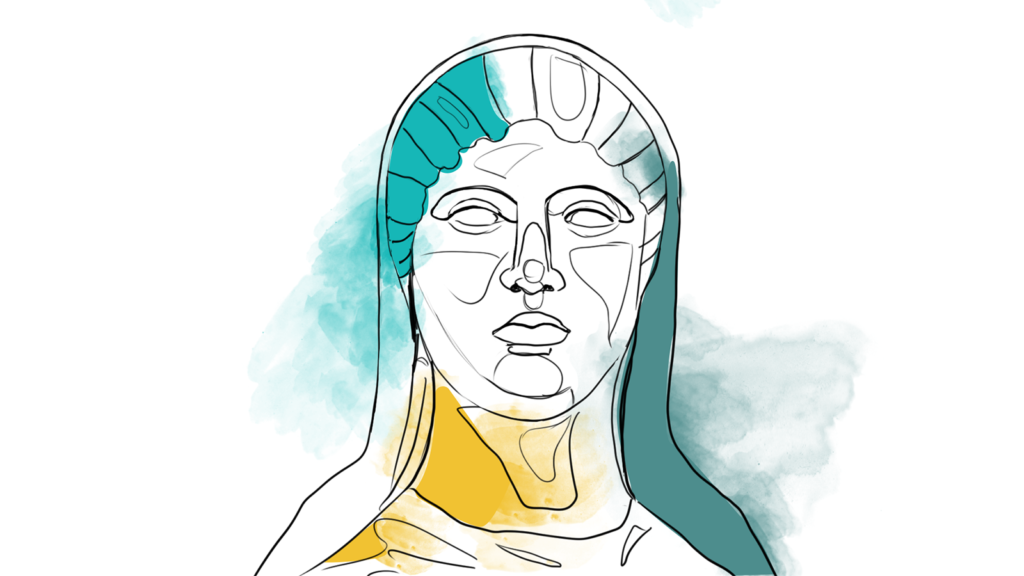You have likely heard of Socrates and Plato, two of the most well-known ancient Greek philosophers. The names Pericles and Cicero may also ring a bell. But Aspasia, a little-known female philosopher with the gift of persuasion, is rarely mentioned in history books. However, she was one of the most influential philosophical figures in Athens.
Aspasia’s father provided her with an education. However, she was forced to leave her home in Miletus, now modern-day Turkey, and found refuge in Athens. Aspasia could not become an Athenian citizen upon arrival. Since she did not have to conform to expectations for Athenian women, Aspasia could do many things that other women could not.
She opened a salon where great thinkers of the day gathered to discuss philosophy and current events. Aspasia was always a part of the discussion and was an intellectual equal. She shared her gift of persuasive speech with Socrates, who later credited her as one of his teachers. Aspasia also taught rhetoric to young girls in Athens and encouraged them to seek more education. There are many lessons we can learn from this fearless philosopher.
This article is part of the Brilliant Thinkers series, which explores the thought processes, working habits, and decision-making principles applied by intellectuals who profoundly impacted the world with their discoveries and the way they challenged the status quo.
Aspasia’s thinking strategies
Aspasia cultivated a life designed around productive debate, collective learning, and community building. In particular, there are three strategies she applied to become one of the most connected philosophers of her times.
1. Turning challenges into opportunities. Instead of seeing her lack of citizenship as an insurmountable barrier, Aspasia saw it as an opportunity. She seized the freedom to design her life outside of traditional expectations, hosting her private salons and building her very own school for young girls.
2. Delighting in debate. Rhetoric is the art of speaking and writing persuasively. While the term has come to have negative connotations, it used to be considered a civic art which Aristotle defined as “a combination of the science of logic and of the ethical branch of politics.” As you can imagine, the art of rhetoric was mostly considered a masculine affair, but Aspasia ignored the traditional expectations of women in Athens, and delighted in the heated conversations she held at her salons. She embraced debate as a powerful learning tool.
3. Establishing a knowledge-sharing hub. Great thinking partners make for great learning opportunities. Aspasia’s logic, debating skills, conversation, and eloquent speech attracted not only fellow philosophers but also artists and scientists. Her followers and supporters held significant positions of power in Athens. Not only did her salons help her grow her own knowledge, but they gave Athenian intellectuals an opportunity to share ideas across disciplines.
She also developed an unusual partnership with military general Pericles. While the two could not marry because of Aspasia’s lack of citizenship (and Pericles was already married), the couple lived together and respected each other as equal parties. Pericles often consulted Aspasia on political matters, which was highly unusual at a time when women were not considered equals.
How to think like Aspasia
Aspasia saw challenges as an opportunity to take the road less traveled. To think like Aspasia is to embrace challenges and to defy societal expectations that can inhibit our ambitions. If you believe the world needs your work, keep on persevering the same way she did with her salons and her school for young girls.
Another of Aspasia’s thinking skills you can draw inspiration from is to develop your power of persuasion. The ability to persuade people is an invaluable skill to succeed in your professional and personal life. Some strategies to strengthen your rhetoric skills include understanding what motivates your audience, identifying and bringing up needs your audience may not have thought of, and using storytelling to convey your point. While it is likely Aspasia mostly practiced her verbal skills, you can also write down your arguments to better spot ways to improve them.
Finally, create or join a learning community. Aspasia created a space for people to share knowledge across disciplines and debate new ideas. With the ability to create a community online or in-person, the opportunities to gain insights and engage with other passionate people are endless. Try finding communities of diverse people who share your thirst for knowledge.
Aspasia was a brilliant philosopher who used her outsider status to defy expectations about what women could accomplish. Even in the face of harsh critiques, she turned challenges into opportunities thanks to the power of persuasion. To follow her influence, we should embrace healthy debates, fight against artificial expectations that limit us, and foster safe spaces to learn together.

